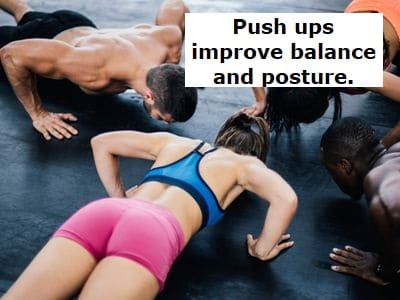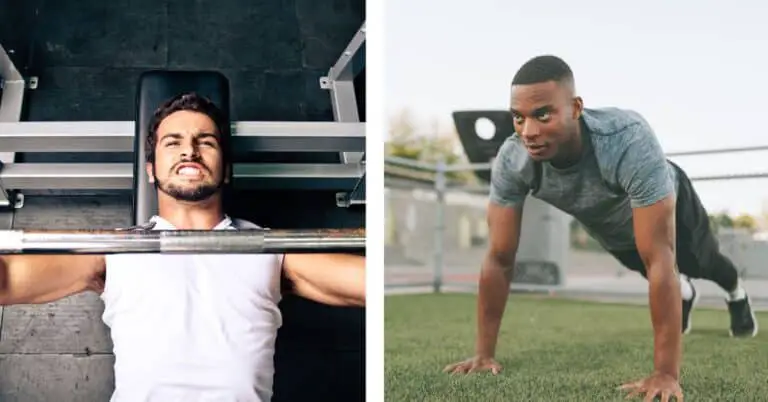
Lots of people wonder whether doing push-ups will improve their bench press. And the answer is…it depends! It depends on a ton of different factors and you need to work out which style of training is right for you before you start. There are many different kinds of strength training, and they all have their pros and cons. The best way to decide what’s right for you is to do lots of research and find one that has studies backing it up.
** I may earn a commission when you purchase through a link on this page. **
What is a bench press?

The bench press is a weightlifting exercise, usually performed with a barbell or dumbbell. You lie on your back on a flat bench and push the weight up off your chest. This can strengthen your pectoral muscles, as well as your triceps, deltoids, trapezius, and even serratus anterior muscles.
What are push-ups?
Push-ups are another strength-building exercise that can be done anywhere. You lie on your stomach and then push yourself off the floor with your arms, raising your body until it’s straight out from the ground. Push-ups also strengthen your deltoids, serratus anterior muscles, and triceps.
Understanding the Mechanics of Push-Ups and Bench Press
Both push-ups and bench press exercises primarily target the chest, shoulders, and triceps. However, the mechanics of each movement are different, which affects how they impact your strength and muscle development. Push-ups involve a more natural range of motion, while bench press allows you to lift heavier weights, providing unique benefits to each exercise.
The Benefits of Push-Ups
Push-ups are the perfect bodyweight exercise that can help develop your upper body strength. This is especially true when it comes to your chest, shoulders, and triceps.
Why the Bench Press is so Effective
The bench press is a staple in bodybuilding. It is known for its ability to develop chest, shoulder, and triceps strength. It allows for progressive overload, which is essential for muscle growth. The bench press can be an invaluable addition to any strength training program.
How Push-Ups Can Complement Bench Press Training
Adding push-ups into your workout routine can actually complement your bench press training. By trying various push-up variations, you can target specific muscle groups that contribute to bench press performance.
Moreover, push-ups can be used to improve muscle endurance, which is beneficial for overall strength training. You can also use push-ups as a warm-up or accessory exercise to activate your muscles before hitting the bench.
Limitations of Push-Ups in Bench Press Improvement
While push-ups can contribute to bench press improvement, there are some limitations to consider. The main difference between the two exercises is the load and resistance: push-ups rely on body weight, while bench press allows you to lift heavier weights.
This difference can lead to a plateau in strength gains, as push-ups may not provide enough resistance to stimulate significant muscle growth. To maximize your bench press performance, it’s important to incorporate additional exercises that target the necessary muscle groups and allow for progressive overload.
Bench press vs Push-up – Which is better for a bigger chest?
In general, the bench press is more effective for building a bigger chest than push-ups. The reason is that the bench press works your pectoral muscles much harder than a push-up does. In fact, according to the American Council on Exercise (ACE), the bench press can be as much as 30% more effective than push-ups at strengthening your chest area.

Do push-ups help your bench press?
Yes, push-ups are a great exercise for strengthening your chest and shoulders. This is because they work the same muscles that you use when you press up on a bench.
For example, doing push-ups can help you build stronger triceps and deltoids (shoulder muscles) so that when you do bench presses, it won’t be as difficult to lift the weight off of the supports.
What is the advantage of doing inclined push-ups?
Inclined push-ups are a great exercise for developing the upper chest and triceps. However, there are many other benefits to doing this exercise regularly.
A study published in the Journal of Strength & Conditioning Research found that incline push-ups were an effective way to increase strength in women with low body mass indexes (BMIs).
The researchers also noted that it was an easy way for overweight people to build muscle without adding bulk or increasing body fat percentage.
How to improve your bench press (video)
I like to lift free weights for the overall body conditioning I get from it as well as to maintain my muscle tone. And while I am not looking for a body-building physique, I find that a combination of weight-lifting techniques yields better results than just heavyweight with one movement.
For maintaining or increasing your chest muscle size, it is important to consider accessory muscle groups for your overall development. Shown above is a great segment on this very topic with Jeff from Athlean-X. If weight training is one of your passions, this channel is excellent.
What is the best way to build larger muscles with weight lighting?
If your goal is to develop or increase a specific muscle group, then you should use weights that are heavy enough to cause muscle failure at the end of your set. This means that you will not be able to complete any more repetitions with proper form, but if you could do more reps, then the weight is too light.
In order to ensure that you are lifting heavy enough weights, it is recommended that people start with a weight they can lift no more than six times and then gradually build up over time until they can complete between 10 and 15 repetitions per set.
Weight lifting vs Push-ups. Which burns the most calories?
The answer is both. The amount of calories burned depends on the number of repetitions, your weight, and how long you do them. According to research published in the journal Medicine & Science in Sports & Exercise, doing push-ups can burn approximately 55 calories per 15 minutes. This may not seem like much at first glance but consider this: If you did 100 push-ups every day for one month, that would be 5500 calories burned!
What does science have to say?
There are three main studies that have looked at push-ups as a form of exercise and their effects on strength. The first study was performed by researchers at the University of Wisconsin, who found that doing push-ups can increase upper body strength in a matter of weeks. The second study was done by researchers from the Department of Health and Human Performance at the University of Maine, who also found that push-ups can help increase upper body strength.
Takeaway
Push-ups can have a very positive impact on your bench press performance by helping you build upper body strength, muscle endurance, and core stabilization.
However, it’s essential to recognize the limitations of push-ups and incorporate other exercises to ensure continued strength gains and maximize your bench press results.
By balancing push-ups with bench press training and other complementary exercises, you’ll be well on your way to unlocking your full strength potential.

Claudia Faucher is a full-time fitness training expert and lifestyle blogger. She is also been a certified Les Mills BodyPump instructor for the past 5 years and a fitness instructor for over 20 years. Claudia is a personal trainer and creates fitness training programs for seniors and people of all ages. She likes to use her skills and experiences to help others on their fitness journeys.

